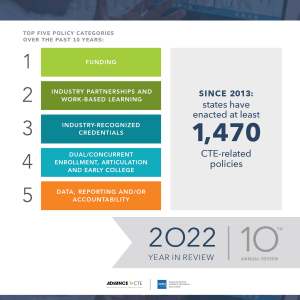Without Limits: A Shared Vision for the Future of Career Technical Education (CTE Without Limits) was released in March 2020 with the support of over 40 national organizations. In October 2021, Advance CTE launched a technical assistance opportunity called Advancing CTE Without Limits, which sought to support states in a project to coordinate systems, improve equity goals, strengthen policy, or otherwise align with a CTE Without Limits principle. The year-long Advancing CTE Without Limits project ran from March 2022 to March 2023. This blog series shares the details, outcomes and lessons learned from projects across the three participating Pushing the Limits state teams – Colorado, Nebraska and South Carolina.
 Project Focus
Project Focus
Colorado has taken significant steps to improve equity in Career Technical Education (CTE), with a focus on ensuring that all students have access to high-quality CTE programs and opportunities.
The Colorado State CTE team made a concerted effort to better align their CTE Strategic Plan with the CTE Without Limits vision principles by conducting a review of their strategic plan through the lens of Principle 2: Each learner feels welcome in, is supported by and has the means to be successful in the career preparation ecosystem.
Colorado’s team focused on three key objectives:
- Needs Assessment: Conduct a needs assessment to identify strengths and gaps of the current CTE system and identify the CTE-specific actions that need to be taken to close gaps and remove barriers for learners.
- Internal, Equity-Focused Professional Development: Elevate the commitment at the state level to ensure equity within CTE through convening an internal team to develop a plan and participate in professional development on equity utilizing the Brave Dialogues resources.
- Building Local Leader Data Literacy: Leverage Advance CTE’s Opportunity Gap Analysis process to increase data literacy of local CTE administrators and educators and in doing so improve data-focused storytelling of learners’ outcome and identification of program participation and success gaps.
Project Outcomes
Through technical assistance sessions with Advance CTE staff, Colorado developed an equity strategy to help bridge the current CTE strategic plan and work on their next State Plan for the Carl D. Perkins Career and Technical Education Act (expiring in 2024). Colorado has shared their equity plan and progress with local CTE Directors at a kickoff meeting where the Opportunity Gap Analysis process and Brave Dialogues training was conducted. Colorado will continue to create spaces to execute implementation of the plan grounded in Principle 2 at their CTE administrators’ convenings during this year.
Colorado established internal team-level goals around each action step within Principle 2 and embedded them into individual performance goals. The Colorado team elevated their focus on CTE program equity, access, and inclusion by settling on an overall goal that is connected to the state CTE strategic plan’s foundational elements and “job-specific” goals to promote a culture of shared growth around competency in equity.
Colorado launched the Opportunity Gap Analysis Workshop training and the Brave Dialogues equity training at The Colorado Association for Career & Technical Administrators (CACTA) conference. Colorado had an overwhelming response from the field about how much they appreciated being “called in” to the conversation and supported through professional development.
Colorado state CTE leaders continue to work towards advanced implementation of Principle 2 and were able to meet certain benchmarks over the course of the year:
- The Colorado CTE team provided feedback about their increased comfortability and feeling of competency to lead conversations and conduct a gap analysis that leads to achieving Principle 2: “Each learner feels welcome in, is supported by and has the means to be successful in the career preparation ecosystem.”
- Colorado achieved a more than 5 percent increase in work-based learning participation for learners who have identified as Black, American Indian or Alaskan Native, Asian/Pacific Islander and Latinx.
Lessons Learned
To address the identified gaps in CTE enrollment, Colorado is working on targeted marketing materials and campaigns to increase awareness about CTE to bolster the pipeline of interested learners. They have made tremendous strides with some school districts and colleges to address barriers to increase enrollment. Colorado is building a team of champions who can advocate for the importance of expanded access and equity for all learners in CTE and articulate the numerous benefits both for the state’s economy as well as for Colorado’s future workforce.
Colorado stressed that the sustainability of this work will be achieved through the continued utilization of the Opportunity Gap Analysis tools as part of Colorado’s Comprehensive Local Needs Assessment (CLNA) process and through building intentional linkages between Principle 2 work and the CTE strategic plan to further benchmark and establish goals tied to CTE data and local performance. Colorado’s team is also committed to work on their own language, implicit bias, personal and professional growth and development as equity-minded leaders.
Stay tuned for future updates about Colorado’s continued efforts or for more information about other states’ Advancing CTE Without Limits projects. For more information about CTE Without Limits, visit https://careertech.org/without-limits.
To learn more about planning and implementing the principles of CTE Without Limits in your state, check out Pushing the Limits: A Roadmap for Advancing CTE Without Limits.
Nithya Govindasamy, Senior Advisor


 One recent dissertation,
One recent dissertation, 



 Last month, Advance CTE hosted the National Summit on Advancing Postsecondary CTE Data Quality & Use (Summit). The convening was the capstone of a two-year initiative, supported by ECMC Foundation, to support leaders in five states in cultivating postsecondary data ecosystems that assist institutions in offering career pathways that meet learner interests and are aligned to good careers. This post shares some of the main takeaways and themes from the Summit.
Last month, Advance CTE hosted the National Summit on Advancing Postsecondary CTE Data Quality & Use (Summit). The convening was the capstone of a two-year initiative, supported by ECMC Foundation, to support leaders in five states in cultivating postsecondary data ecosystems that assist institutions in offering career pathways that meet learner interests and are aligned to good careers. This post shares some of the main takeaways and themes from the Summit. The Summit also celebrated high-quality data system achievements outside of the PDI cohort. The first plenary featured a panel of Anna Fontus, Program Officer, ECMC Foundation; Su Jin Jez, Executive Director, California Competes; and Paige Kowalski, Executive Vice President, Data Quality Campaign. The panelists spoke on effective strategies to build support for California’s P20 Cradle-to-Career Data System, including:
The Summit also celebrated high-quality data system achievements outside of the PDI cohort. The first plenary featured a panel of Anna Fontus, Program Officer, ECMC Foundation; Su Jin Jez, Executive Director, California Competes; and Paige Kowalski, Executive Vice President, Data Quality Campaign. The panelists spoke on effective strategies to build support for California’s P20 Cradle-to-Career Data System, including: The second plenary session was delivered by Delaware’s State CTE Director, Jonathan Wickert. Jon spoke to the change management that enabled major shifts in the state’s postsecondary CTE data practices and system. At the center, Delaware prioritized building buy-in among staff and institution-level leaders and practitioners through many rounds of listening and feedback sessions. The state put itself in the seat of convener and let its stakeholders guide the principles and questions that would be addressed by new data routines and system requirements. This work resulted in a shared mission statement, principles and research agenda that ensures stakeholders and users needs are met by data system improvements.
The second plenary session was delivered by Delaware’s State CTE Director, Jonathan Wickert. Jon spoke to the change management that enabled major shifts in the state’s postsecondary CTE data practices and system. At the center, Delaware prioritized building buy-in among staff and institution-level leaders and practitioners through many rounds of listening and feedback sessions. The state put itself in the seat of convener and let its stakeholders guide the principles and questions that would be addressed by new data routines and system requirements. This work resulted in a shared mission statement, principles and research agenda that ensures stakeholders and users needs are met by data system improvements.  That leaves remaining challenges around data capacity. Even as youth apprenticeship programs increase their enrollment, the existing apprenticeship data infrastructure is insufficient to monitor and support these emerging programs. State and federally administered Registered Apprenticeship programs can submit data through the Registered Apprenticeship Partners Information Database System (RAPIDS), but this system cannot yet differentiate between traditional and youth apprenticeship programs.
That leaves remaining challenges around data capacity. Even as youth apprenticeship programs increase their enrollment, the existing apprenticeship data infrastructure is insufficient to monitor and support these emerging programs. State and federally administered Registered Apprenticeship programs can submit data through the Registered Apprenticeship Partners Information Database System (RAPIDS), but this system cannot yet differentiate between traditional and youth apprenticeship programs.  My name is Candace Williams and I’m thrilled to be joining the talented team at Advance CTE! In my role as Senior Research Associate, I’ll be supporting Advance CTE’s data quality and research initiatives. I’ll be working on a number of projects, including the Postsecondary Data Initiative, the Credit for Prior Learning Shared Solutions Working Group, and a forthcoming study on state Career Technical Education (CTE) funding.
My name is Candace Williams and I’m thrilled to be joining the talented team at Advance CTE! In my role as Senior Research Associate, I’ll be supporting Advance CTE’s data quality and research initiatives. I’ll be working on a number of projects, including the Postsecondary Data Initiative, the Credit for Prior Learning Shared Solutions Working Group, and a forthcoming study on state Career Technical Education (CTE) funding.